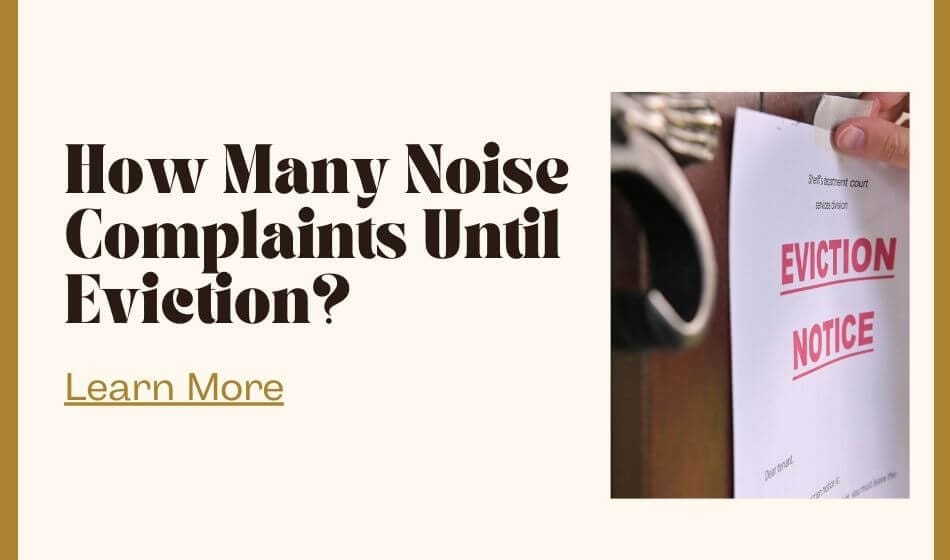Noise complaints are one of the most common issues between tenants and landlords. While some complaints can be minor, repeated or excessive noise disturbances can lead to eviction.
Whether you are a tenant facing a noise complaint or a landlord dealing with a noisy renter, it is important to understand the legal process, the rights of all parties involved, and the best ways to resolve disputes before they escalate.
This guide will provide an in-depth look at noise complaints, eviction procedures, and potential defenses for tenants.
Quick Summary
Noise complaints are a common issue in rental community, and repeated disturbances can lead to eviction. Landlords must follow legal procedures, including providing warnings, documenting complaints, and filing an eviction notice if necessary.
Tenants have rights and can defend themselves against eviction by proving a lack of evidence, improper procedures, or unfair treatment. Open communication, mediation, and dispute resolution can often prevent eviction and help both parties reach an agreement.
Understanding the legal process, tenant rights, and best practices for handling noise complaints can help landlords and tenants avoid unnecessary conflicts.
Overview of Noise Complaints
Noise complaints can arise in rental properties for various reasons. Common sources include loud music, parties, barking dogs, construction, and general disturbance.
Tenants are typically expected to maintain reasonable noise levels, especially during nighttime hours. Many lease agreements outline quiet hours and acceptable noise levels to prevent disputes.
Neighbors or other tenants in a building may file complaints if they feel the noise is excessive or persistent. Landlords have an obligation to address these concerns to maintain a peaceful living environment for all tenants.
Legal Grounds for Eviction
Landlords cannot evict tenants based on a single noise complaint in most cases. However, if the noise is frequent, excessive, or violates local laws and lease agreements, an eviction may be legally justified.
Legal grounds for eviction due to noise complaints may include:
- Violation of lease terms regarding noise levels
- Disruption of other tenants’ right to quiet enjoyment
- Multiple documented complaints from neighbors
- Failure in compliance with previous warnings or notices.
Each state and city has different rules regarding noise disturbances, so landlords must follow the legal process for eviction to ensure it is valid.
Documentation and Evidence
For an eviction to be legally enforced, the landlord must provide sufficient documentation proving that noise disturbances have occurred. Evidence may include:
- Written complaints from neighbors or building management
- Police reports or noise violation citations
- Audio or video recordings of excessive noise
- Copies of previous warnings or notices sent to the tenant
Proper documentation helps ensure that the eviction is based on legitimate reasons rather than personal disputes. Tenants should also keep records if they believe the claims against them are false or exaggerated.
Communicating with Tenants
Open communication between landlords and tenants can help resolve noise complaints without the need for eviction. Landlords should notify tenants of any issues and allow them to address the problem before taking further action.
Recommended steps for communication include:
- Speaking with the tenant about the complaint before issuing a formal notice
- Providing details about the complaint, including dates and times of reported noise
- Offering solutions such as soundproofing or adjusting noise levels during certain hours
Many tenants may not be aware that their activities are disturbing others, and a simple conversation can prevent further issues.
Warning Notices and Their Importance
A formal warning notice is typically the first step in addressing noise complaints before eviction. This notice serves as an official record that the tenant has been informed of the issue and given a chance to correct it.
A proper warning notice should include:
- The date and details of the noise complaint
- Reference to lease agreement clauses about noise disturbances
- The consequences of continued noise violations
- A deadline for resolving the issue
If the tenant does not comply with the warning, the landlord may proceed with further legal action.
Internal Dispute Resolution
In many cases, noise complaints can be resolved through mediation or internal dispute resolution processes. Some rental properties or housing associations offer formal complaint resolution programs to help tenants and landlords settle disputes without going to court.
Methods for resolving disputes include:
- Mediation between tenants and neighbors
- Adjustments to quiet hours or noise policies of the contract
- Installing soundproofing or noise-reducing materials
- Agreeing on a compromise to limit disturbances
Landlords and tenants should explore these options before escalating the issue to eviction.
Filing an Eviction Notice
If noise complaints continue despite warnings and mediation efforts, a landlord may proceed with filing an eviction notice. This process must follow local laws and lease agreements to be legally valid.
A typical eviction notice includes:
- A clear statement that the tenant is being evicted due to noise disturbances
- Evidence supporting the eviction claim
- A deadline for the tenant to vacate the property
- Information about the next legal steps if the tenant refuses to leave
The eviction notice must be delivered according to local regulations, often requiring certified mail or in-person service.
Court Process and Hearings
If the tenant does not leave voluntarily, the landlord may file an official eviction lawsuit. This process involves:
- Submitting the required legal documents to the local court
- Serving the tenant with a court summons
- Attending a court hearing where both parties present their arguments
At the hearing, the judge will review the evidence and decide whether the eviction is justified. If the judge rules in favor of the landlord, the tenant will be given a deadline to move out. If the tenant wins the case, they can remain in the property.
Defenses Against Eviction
Tenants facing eviction for noise complaints have the right to defend themselves in court. Possible defenses include:
- Lack of proper warnings or notices from the landlord
- Insufficient evidence proving excessive noise
- Retaliation by the landlord for unrelated disputes
- Inconsistent enforcement of noise rules among tenants
If a tenant believes they are being unfairly evicted, they should gather evidence, seek legal advice, and present their case in court.
Post-Eviction Considerations
If a tenant is evicted due to noise complaints, there are important factors to consider for the future. An eviction can negatively impact a tenant’s rental history and credit score, making it more difficult to secure housing in the future.
Steps to take after an eviction:
- Finding alternative housing as soon as possible
- Discussing options for settling any outstanding rent or fees with the landlord
- Reviewing rental agreements carefully before signing a new lease
- Avoiding similar noise issues in future rental properties
For landlords, ensuring proper legal procedures were followed helps prevent wrongful eviction claims and legal complicatio












